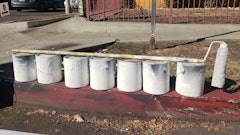The American Glass Bead Manufacturers' Association has applauded the recent passage of New Jersey legislation which limits the use of heavy metals in glass beads for highway markings. New Jersey Gov. Chris Christie recently signed the new law into effect after unanimous approval by the state Assembly and Senate.
New Jersey joins Louisiana and North Carolina in establishing state law which limits the levels of heavy metals (arsenic and/or lead) in glass bead products which are used for highway safety markings throughout the world, according to the association. New Jersey Bill A1448 prohibits the manufacture or sale of reflective glass beads with high arsenic content and prohibits the state's Department of Transportation and state's toll road authorities from using paint mixed with reflective glass beads for roadway markings. Meanwhile, a total of 22 other states have adopted bid specification requirements which also prohibit use of heavy metals in glass beads.
"We're thrilled with New Jersey's leadership and bold action in limiting heavy metals in glass beads," said Bob McClune, president of AGBMA. "Their foresight and legislative work will ensure the protection of the environment, state highway workers, and the public at large."
McClune added that the New Jersey legislation was directly impacted by the findings of the New Jersey Institute of Technology/Rowan University study, funded by the New Jersey Department of Transportation. That study revealed that a growing number of imported glass bead products for highway markings exhibit high concentrations of heavy metals, including arsenic and lead.
Prior research work has shown that imported glass beads do have high levels of arsenic and lead and were quickly susceptible to leaching with exposure to ground water and normal environmental conditions. The high levels of these heavy metal substances pose a hazard to highway worker safety and an environmental threat in terms of runoff into the soil, surface water, and drinking water, according to the association.
Over the past several years, the association has worked diligently to raise awareness of the issue, citing the need to hold all manufacturers to higher quality standards that protect the environment and highway worker safety by avoiding the use of products that contain hazardous materials. Setting a heavy metals standard for glass beads has gained strong support from environmental groups like the Sierra Club, state and federal lawmakers, and unions like the International Union of Operating Engineers.
The focus on avoiding the utilization of glass beads containing hazardous materials is intensifying globally with the European Union, Australia, New Zealand, and several Canadian provinces already setting similar standards. China, a major source of these questionable glass beads, has also set strict heavy metal standards for internal use but continues to export contaminated glass bead products to other nations, including the U.S., according to the association.

























